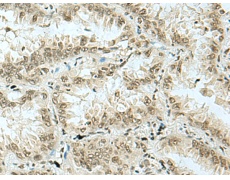中文名稱: 兔抗HAS1多克隆抗體
英文名稱: Anti-HAS1 rabbit polyclonal antibody
別 名: hyaluronan synthase 1; HAS
相關(guān)類別: 一抗
儲(chǔ) 存: 冷凍(-20℃)
宿 主: Rabbit
抗 原: HAS1
反應(yīng)種屬: Human, Mouse
標(biāo) 記 物: Unconjugate
克隆類型: rabbit polyclonal
Background:
Hyaluronan or hyaluronic acid (HA) is a high molecular weight unbranched polysaccharide synthesized by a wide variety of organisms from bacteria to mammals, and is a constituent of the extracellular matrix. It consists of alternating glucuronic acid and N-acetylglucosamine residues that are linked by beta-1-3 and beta-1-4 glycosidic bonds. HA is synthesized by membrane-bound synthase at the inner surface of the plasma membrane, and the chains are extruded through pore-like structures into the extracellular space. It serves a variety of functions, including space filling, lubrication of joints, and provision of a matrix through which cells can migrate. HA is actively produced during wound healing and tissue repair to provide a framework for ingrowth of blood vessels and fibroblasts. Changes in the serum concentration of HA are associated with inflammatory and degenerative arthropathies such as rheumatoid arthritis. In addition, the interaction of HA with the leukocyte receptor CD44 is important in tissue-specific homing by leukocytes, and overexpression of HA receptors has been correlated with tumor metastasis. HAS1 is a member of the newly identified vertebrate gene family encoding putative hyaluronan synthases, and its amino acid sequence shows significant homology to the hasA gene product of Streptococcus pyogenes, a glycosaminoglycan synthetase (DG42) from Xenopus laevis, and a recently described murine hyaluronan synthase. Alternative splicing results in multiple transcript variants.
Applications:
ELISA, IHC
Name of antibody:
HAS1
Immunogen:
Synthetic peptide of human HAS1
Full name:
hyaluronan synthase 1
Synonyms:
HAS
SwissProt:
Q92839
ELISA Recommended dilution:
5000-10000
IHC positive control:
Human ovarian cancer and Human lung cancer
IHC Recommend dilution:
50-200
技術(shù)規(guī)格


 購物車
購物車 幫助
幫助
 021-54845833/15800441009
021-54845833/15800441009

